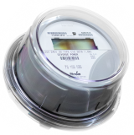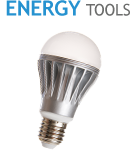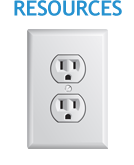Safety Information
Safety tips to consider when working or playing near power lines
Overhead Dangers
First, never touch a wire or allow anything you’re holding to touch one. Things like ladders, antennas, sailboat masts or even fishing poles, kites and balloons can offer electric current a direct path to the ground. Don’t climb trees near power lines, and be especially careful to stay clear of power lines when working on a roof.
Equipment Dangers from Overhead Lines
Construction equipment such as cranes, backhoes, and boom trucks can create an effective path to ground for electricity if the equipment comes into contact with overhead power lines. This type equipment should not be used closer than 10 feet of a power line. Farm implements like grainaugers, and harvesting equipment carry special risks. If you’re involved with moving large metal objects, make sure they don’t come within ten feet of a power line. Aluminum irrigation systems are a similar hazard. Even though such equipment is on rubber tires, if it touches a line and you touch it, your body becomes a path to the ground.
Downed Wire Dangers
If a downed line falls on your vehicle while you’re inside, drive out from under it. If you can’t drive away, don’t get out of the car. Stay put until help arrives! When electricity is flowing into the ground from a downed line, the earth around it is energized in a pattern of concentric circles of different voltage levels. If you walk over those circles, your body can become the shortest path between the differing voltages. Therefore, if you must get out of the vehicle, jump clear of the vehicle without touching it and the ground at the same time, land with both feet together, and hop with both feet together away from the area.
Distribution Equipment
These green metal boxes house the transformers for underground electric service. They are securely locked for your protection. If one is damaged, call us immediately. And please don’t dig around them to install landscaping. Substations contain higher voltages and are always protected by fences and locks.
Never try to go inside the fence. If you need to retrieve something, like a ball or a pet, call us. We’ll come and get it for you.
Standards
Safety requirements are spelled out in a number of state and national laws. The National Electrical Code specifies electrical safety standards for building wiring, and the National Electrical Safety Code does the same for all power supply systems.
OSHA — The Occupational Safety and Health Administration –determines an employer’s responsibilities to protect workers.
High Voltage Safety Act In Georgia — the High Voltage Safety Act is designed to prevent injury to people or property and interruptions in electric service due to accidental contact with high voltage lines. The High Voltage Safety Act requires anyone who needs to work within ten feet of an overhead power line to call the Utilities Protection Center at least 72 hours before work begins so that utilities may take safety precautions.
Another statute — the “Call Before You Dig” law — requires anyone digging in the ground to call the Utilities Protection Center at least 72 hours before digging so that underground utilities may be located and marked. Call 1-800-282-7411, or in Atlanta 770-623-4344.
What You Can Do For Us
You can also help us by reporting outside electrical equipment which looks unsafe to you. And please be careful when driving past our crews working along roadways.






